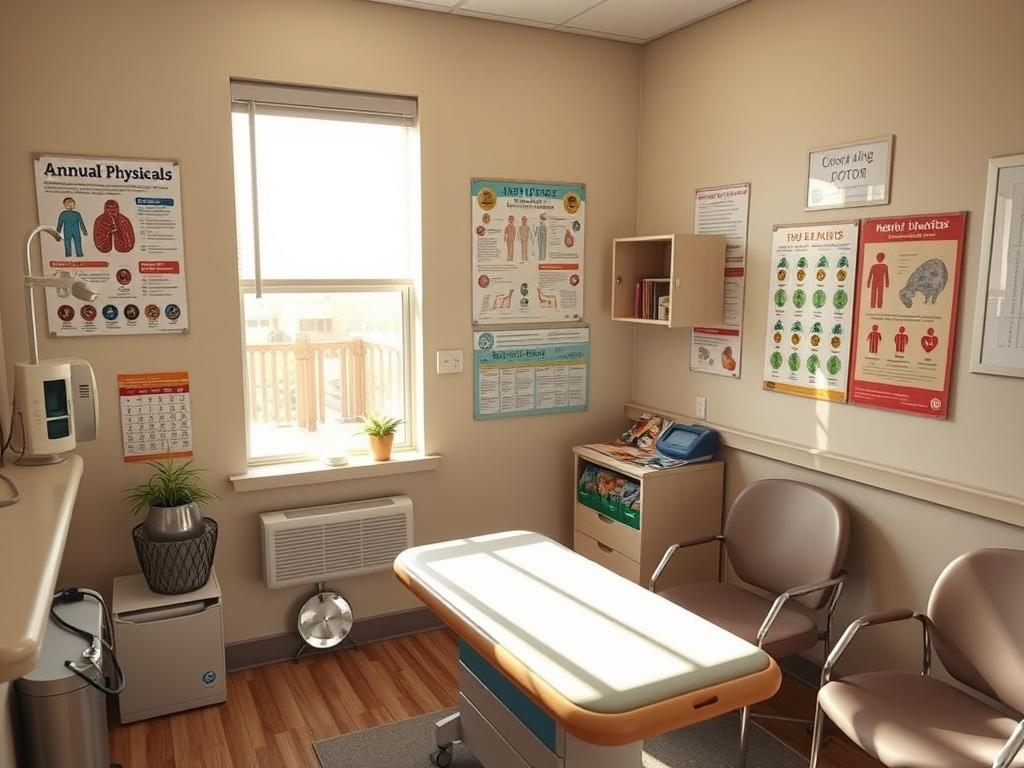Did you know that approximately 86% of American adults have at least one chronic illness, and routine medical checkups can help find potential health issues before they become a significant problem? This staggering statistic emphasizes the crucial role that regular health check-ups play in maintaining overall wellness and catching health concerns early. Regular medical checkups are essential for promoting preventative healthcare, allowing for tailored approaches to individual health needs, thereby significantly improving health outcomes.
According to a comprehensive review by Northwestern Medicine, routine health screenings are pivotal as they not only improve the detection and management of chronic conditions but also enhance vaccinations, cancer screenings, and patient-reported outcomes. These visits provide an opportunity for adults to discuss lifestyle risks and make informed choices about their health. Following a recommendation for an annual wellness exam if you are under 50 and in good health, or more frequently if you have chronic conditions, can be a proactive step towards a healthier life.
In summary, the importance of regular medical checkups for better health cannot be overstated. These essential appointments foster a deeper understanding of personal health, empowering individuals to take control of their well-being through education and preventative measures.
Key Takeaways
- Routine medical checkups can help identify potential health issues early.
- Annual wellness exams are generally recommended for individuals under 50.
- Regular checkups aid in the management of chronic diseases.
- Preventative care includes vaccinations and cancer screenings.
- Building a relationship with a primary care provider is key to effective healthcare.
Understanding the Role of Medical Checkups in Preventive Care
Medical checkups play a vital role in maintaining health through preventative healthcare. These routine health screenings are designed to assess an individual’s health status and pinpoint potential risks. By conducting comprehensive medical examinations during primary care visits, healthcare providers can intervene early, significantly improving treatment outcomes.
What are Medical Checkups?
Medical checkups, commonly referred to as wellness exams or annual physicals, consist of a series of evaluations and tests aimed at promoting overall well-being. These checkups typically involve a physical examination, necessary screening tests, and discussions regarding medical history and lifestyle choices. Regular visits afford opportunities to establish health baselines, which help in monitoring changes over time. The proactive approach of these checkups is essential for early detection of health issues that may not present obvious symptoms, including hypertension and diabetes.
Key Benefits of Preventive Care
Engaging in preventive care through routine checkups offers several advantages:
- Early Detection: Regular checkups lead to the identification of conditions like certain cancers, which can often be treated more effectively when detected in their initial stages.
- Chronic Disease Management: Monitoring chronic conditions such as asthma and diabetes allows for optimal health outcomes and construction of personalized health strategies.
- Cost-Effectiveness: Investing in preventative healthcare can reduce overall healthcare costs by addressing issues early, thus avoiding more complex treatments later.
- Vaccinations: Regular checkups ensure necessary immunizations are up-to-date, preventing infectious diseases.
- Mental Health Support: Yearly checkups provide a chance to address emotional well-being and stress management, which impacts overall quality of life.

The cumulative effects of engaging in regular medical checkups cannot be understated. By focusing on preventative care, individuals actively contribute to their health, benefiting themselves and their communities.
Identifying Health Issues Before They Become Serious
Regular health check-ups play a crucial role in identifying conditions before they evolve into serious health issues. Not only do these routine health screenings allow for early detection of diseases, but they also help in managing existing chronic conditions, facilitating more effective treatment and better overall health outcomes.
Early Detection of Diseases
Early identification of health issues like diabetes, hypertension, or certain forms of cancer can drastically enhance treatment success. Regular health check-ups enable healthcare providers to monitor vital signs such as blood pressure, cholesterol levels, and blood sugar. This proactive approach ensures that potential risks can be addressed timely. Additionally, routine health screenings involve tests tailored to individual risk factors, significantly improving early disease detection.
Managing Chronic Conditions
For individuals with chronic illnesses, such as heart disease or diabetes, health check-ups become indispensable. These visits allow healthcare providers to adjust medications and treatment plans as necessary. Monitoring progress during routine health screenings helps in understanding the effectiveness of current treatments and provides crucial feedback for patients. Strategies for lifestyle management, particularly around nutrition and stress management, can be discussed as a part of comprehensive care. Prioritizing such preventive care significantly improves the quality of life and reduces complications related to unmanaged chronic conditions. For practical tips on enhancing cognitive function through methods like mindfulness meditation, you can explore stress management techniques.

| Disease | Screening Method | Frequency |
|---|---|---|
| Diabetes | Blood sugar test | Annually for adults 45 and older |
| Hypertension | Blood pressure assessment | Every visit or at least once a year |
| Cancer | Mammograms for women; Prostate exams for men | As recommended based on age and risk factors |
Recommended Frequency of Checkups by Age Group
Understanding the recommended frequency of checkups is crucial for maintaining health across different life stages. Regular medical checkups, including annual physicals and specific screenings, ensure early detection of potential issues while promoting preventive care. The frequency of these doctor visits varies by age, gender, and health conditions.
Children and Adolescents
Children require regular checkups beginning in infancy, with visits scheduled every month until 30 months of age. After that, annual visits remain essential for tracking growth and immunizations. These early doctor visits help identify developmental milestones and any emerging health concerns.
Adults
For adults, routine annual physicals become increasingly important. Women in their 20s and 30s should conduct self-exams for breast health and skin cancer monthly, alongside annual screenings for blood pressure and BMI. In their 40s, women should consider yearly mammograms and skin exams, while men in this age group are encouraged to have full-body skin exams annually. As individuals reach their 50s, recommendations shift to more specialized tests such as cholesterol assessments and colon cancer screenings, enhancing proactive care.
Seniors
Seniors often need more frequent doctor visits to manage age-related health issues effectively. Women in their 60s should have dementia screenings annually, while men should also partake in yearly preventive visits. At this stage, comprehensive health assessments become critical. Regular checkups help monitor various conditions and enable discussions of new symptoms that may arise.
| Age Group | Recommended Checkup Frequency | Key Screenings |
|---|---|---|
| Children (0-2 years) | Monthly visits until 30 months, then annually | Growth and vaccinations |
| Adults (20s-30s) | Annually | Self-exams, blood pressure, BMI |
| Adults (40s) | Annually | Mammograms, full-body skin exams, cholesterol checks |
| Adults (50s) | Annually for cholesterol; every 10 years for others | Bone density, thyroid panels |
| Seniors (60+) | Annually | Dementia screenings, vision, and hearing tests |

The Connection Between Checkups and Overall Well-Being
Regular medical checkups play a crucial role in enhancing overall well-being, encompassing both physical and mental health. These wellness exams allow individuals to monitor health trends, facilitating early intervention for potential issues. By routinely engaging in preventative healthcare, patients can catch irregularities before they escalate into more severe conditions. In this supportive environment, individuals gather essential information to make healthier lifestyle choices.
Physical Health
Physical health benefits greatly from annual checkups. Medical professionals recommend comprehensive assessments to screen for various conditions, including coronary heart disease and certain cancers. Regular visits empower individuals to manage chronic issues in a timely manner, improving overall health outcomes. In addition, these visits often involve critical screenings for blood pressure, cholesterol, and other vital indicators of health status.
Mental Health
Checkups also serve as an essential touchpoint for mental health discussions. Patients often express concerns regarding anxiety or depression during their visits, receiving valuable screenings and coping strategies. This integrative approach fosters a positive relationship with healthcare providers, promoting mental well-being as part of one’s overall health strategy. By focusing on both physical and mental aspects, individuals can significantly boost their quality of life.
Incorporating insights from checkups into daily routines not only addresses immediate health concerns but also builds a foundation for long-term wellness. Engaging in preventative healthcare means identifying risk factors effectively and managing existing health conditions wisely. For more information on the importance of regular health check-ups, explore the benefits of routine visits. For insights on enhancing mental clarity through personal audits, visit this resource.
Common Tests and Screenings During Checkups
During routine health screenings, medical examinations often include a variety of tests essential for assessing an individual’s health status. These evaluations play a critical role in detecting potential health issues early, allowing for timely interventions and improved outcomes.
Blood Pressure and Cholesterol
Blood pressure and cholesterol readings are fundamental components of routine health assessments. Regular monitoring helps identify hypertension, a prevalent condition among adults aged 18-64. Blood cholesterol checks are recommended within the same age group to evaluate cardiovascular health and to spot risks for heart disease. Both tests are routinely conducted to foster early detection and management.
Blood Tests
Blood tests serve numerous purposes during medical examinations. They can assess glucose levels, which is crucial for detecting diabetes. Beyond glucose, these tests may evaluate other vital markers that contribute to determining overall health. The inclusion of blood testing in routine screenings arms individuals with important knowledge about their health metrics.
Cancer Screenings
Cancer screenings form a significant part of preventive health care. In adults aged 18-64, various screenings are common, including mammograms for breast cancer and colonoscopies for colorectal cancer. Regular skin exams can help identify suspicious moles or changes. Early detection through these screenings can drastically improve treatment outcomes.
| Test/Screening | Recommended Age | Frequency |
|---|---|---|
| Blood Pressure Check | 18+ | Every 2 years |
| Cholesterol Screening | 20+ | Every 4-6 years |
| Blood Glucose Test | 45+ | Every 3 years |
| Colorectal Cancer Screening | 45+ | Every 10 years |
| Mammogram | 40+ | Annually or biennially |
| Bone Density Test | 65+ | Every 2 years |
Staying informed and proactive about health through these routine health screenings and medical examinations is vital for maintaining wellness at all life stages. Regular check-ups ensure that individuals can manage their health effectively and respond swiftly to any potential risks.
How to Prepare for Your Medical Checkup
Preparing for your medical checkup can significantly enhance the quality of your visit. Taking the time to gather medical history and relevant information ensures that you and your healthcare provider can address your health needs effectively. This proactive approach allows for thorough evaluations and informed health decision-making during doctor visits.
Gathering Medical History
Before your appointment, compile your medical history, including any past illnesses, surgeries, and treatments. Be sure to note your family history of illnesses, as this information is crucial for your doctor to assess potential risk factors. Keeping a detailed list of your current medications, including dosages and frequency, is essential. Don’t forget to note any allergies or previous reactions to medications or treatments.
Additionally, track any recent health changes you’re experiencing. This can include new symptoms, changes in lifestyle, or the onset of stressors. Being organized with this information makes it easier for your doctor to understand your health situation and address your concerns effectively during the visit.
Questions to Ask Your Doctor
Prepare a list of questions to bring to your doctor visit. Having clear queries helps maximize the effectiveness of your time together. Consider asking about:
- Screening tests appropriate for your age and gender
- Recommendations for maintaining a healthy lifestyle
- Possible next steps if tests reveal issues
- Clarification on any medications or treatments
Make it a habit to engage in the conversation with your healthcare provider. Regular doctor visits become opportunities for education and empowerment, especially when you are proactive in gathering medical history and voicing your health questions. Investing in your health through preparation can make a significant difference in achieving better outcomes.
Building a Healthy Relationship with Your Healthcare Provider
A strong healthcare provider relationship is essential for achieving optimal health outcomes. Effective communication plays a pivotal role in fostering trust, allowing patients to discuss their health concerns and treatment preferences openly. When patients and healthcare providers engage in candid conversations, it leads to more tailored care plans, ensuring that both parties are aligned on health goals. This open dialogue not only enhances satisfaction during primary care visits but also contributes to better health outcomes.
Importance of Communication
Being comfortable discussing worries and experiences with your healthcare provider creates an environment conducive to mutual understanding. Building trust through respectful communication enables patients to feel empowered in managing their health. By actively participating in discussions about their conditions, patients can share critical information that assists providers in delivering informed recommendations. Whether you’re addressing new symptoms or discussing treatment adjustments, clear communication is the foundation of an effective healthcare provider relationship.
Trust and Comfort in Healthcare
Maintaining a trusting and comfortable atmosphere during medical appointments is key to fostering a healthy patient-provider relationship. Regular follow-ups and consistent engagement with healthcare providers allow for ongoing dialogues about any necessary adjustments in treatment or monitoring of existing conditions. Engaging in open conversations about lifestyle factors, medication side effects, or family health history can significantly enhance the overall healthcare experience. For further insights on establishing strong health partnerships, explore how to strengthen your healthcare provider relationship or check practical parenting techniques here.











